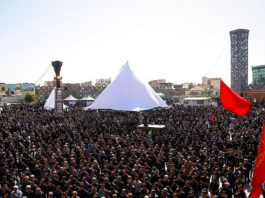Question: What advice can you give after Ramadaan?
Answer :
Praise be to Allah
I wonder whether the fasting person continued after Ramadaan to be as he was during Ramadaan, or is he like her who undoes the thread which she has spun, after it has become strong [cf. al-Nahl 16:92]? I wonder whether the one who during Ramadaan was fasting, reciting and reading Quraan, giving and spending in charity, praying at night, making duaa, will he be like that after Ramadaan, or will he follow another path, I mean the path of the Shaytaan, so that he commits sin and does things that anger the Most Gracious, Most Merciful?
If a Muslim continues to have the patience to do righteous deeds after Ramadaan, this is a sign that his (fasting) has been accepted by his Lord, the Most Generous, the Bestower of blessings. If he fails to do righteous deeds after Ramadaan, and follows the ways of the Shaytaan, this is a sign of humiliation, meanness, lowly status and being deprived of the help of Allah, as al-Hasan al-Basri said: They were no longer of any significance to Allah, so they committed sin. If they had mattered to Him, He would have protected them. When a person becomes insignificant to Allah, Allah will no longer honour him. Allah says (interpretation of the meaning):
| And whomsoever Allah disgraces, none can honour him [al-Hajj 22:18] |
What is amazing is that during Ramadaan, you see some people who fast and pray at night, who spend in charity and worship the Lord of the Worlds, then no sooner has the month come to an end, but their nature changes completely, and they begin to have a bad attitude towards their Lord. So you see them neglecting prayer and avoiding righteous deeds, committing sins and disobeying Allah in many different ways, keeping away from obedience towards Allah, the Sovereign, the Holy, the One Free from all defects.
How terrible it is, by Allah, when people only acknowledge Allah in Ramadaan.
The Muslim should make Ramadaan an opportunity to turn over a new leaf by repenting, turning to Allah, persisting in worshipping Allah, always being aware that Allah is watching at every minute of every hour. So after Ramadaan the Muslim should continue to obey Allah and should avoid sin and evil actions, as a continuation of the way he was during Ramadaan and the things that he did then to draw closer to the Lord of creation.
Allah says (interpretation of the meaning):
| And perform As Salaah (Iqaamat as Salaah), at the two ends of the day and in some hours of the night [i.e. the five compulsory Salaah (prayers)]. Verily, the good deeds remove the evil deeds (i.e. small sins). That is a reminder (an advice) for the mindful (those who accept advice)[Hood 11:114] |
The Prophet (peace and blessings of Allah be upon him) said:
| Follow a bad deed with a good deed, for it will wipe it out; and have a good attitude and good manners towards people. |
Undoubtedly the purpose for which Allah created everyone was to worship Him Alone, with no partner or associate. This is the ultimate purpose and the highest aim, which is to attain uboodiyyah (being a slave of Allah in the truest and fullest sense). This was achieved in the most beautiful manner during Ramadaan, when we saw people going to the houses of Allah in groups and individually, and we saw them striving to perform the obligatory prayers on time and to give in charity, competing with one another in doing good deeds. And for this let (all) those strive who want to strive (cf. al-Mutaffifeen 83:26), for they will be rewarded in sha Allah. But there remains the case of those whom Allah keeps firm with the word that stands firm in this world and in the Hereafter (cf. Ibraaheem 14:27). Whomever Allah helps to be steadfast in doing righteous deeds after Ramadaan, Allah says (interpretation of the meaning):
| To Him ascend (all) the goodly words, and the righteous deeds exalt it (i.e. the goodly words are not accepted by Allah unless and until they are followed by good deeds), but those who plot evils, theirs will be severe torment. And the plotting of such will perish[Faatir 35:10] |
Undoubtedly righteous deeds are among the acts which bring a person closer to Allah at all times, and the Lord of Ramadaan is also the Lord of Jumaada and Shabaan and Dhul-Hijjah and Muharram and Safar and all the other months. That is because the worship that Allah has enjoined upon us includes five pillars, one of which is fasting, which is for a set period which has come to an end. But there remain other pillars, Hajj, prayer and zakaah, for which we are answerable to Allah. We must perform these duties in the manner which is pleasing to Allah, and we must strive thereby to fulfil the purpose for which we were created. Allah says (interpretation of the meaning):
| And I (Allah) created not the jinn and mankind except that they should worship Me (Alone)[al-Dhaariyaat 51:56] |
The Prophet (peace and blessings of Allah be upon him) taught his Companions to compete in doing good, and he said, One dirham may weigh more with Allah than a dinar, and the best of charity is that a man gives when he is rich. He (peace and blessings of Allah be upon him) explained that if the person gives charity when he is disinclined to do so and is in good health, but fears poverty, that charity will weigh heavily with Allah in the balance of good deeds; whereas the one who delays it, then when he gets sick he starts to spend in charity here and there, fearing that his good deeds will be rejected, there is the danger that his (charity) will not be accepted we seek refuge with Allah. Allah says (interpretation of the meaning):
| Allah accepts only the repentance of those who do evil in ignorance and foolishness and repent soon afterwards; it is they whom Allah will forgive and Allah is Ever All Knower, All Wise.
And of no effect is the repentance of those who continue to do evil deeds until death faces one of them and he says: Now I repent; nor of those who die while they are disbelievers. For them We have prepared a painful torment[al-Nisaa 4:17-18] |
| Verily, those who say: Our Lord is Allah (Alone), and then they stand firm, on them the angels will descend (at the time of their death) (saying): Fear not, nor grieve! But receive the glad tidings of Paradise which you have been promised!
We have been your friends in the life of this world and are (so) in the Hereafter. Therein you shall have (all) that your inner selves desire, and therein you shall have (all) for which you ask[Fussilat 41:30-31] |
| And whosoever takes Allah, His Messenger, and those who have believed, as Protectors, then the party of Allah will be the victorious [al-Maaidah 5:56]
Verily, those who say: Our Lord is (only) Allah, and thereafter stand firm (on the Islamic Faith of Monotheism), on them shall be no fear, nor shall they grieve [al-Ahqaaf 46:13] |
| If you avoid the great sins which you are forbidden to do, We shall expiate from you your (small) sins, and admit you to a Noble Entrance (i.e. Paradise) [al-Nisaa 4:31] |
The believer should join the caravan of those who stand firm and should board the ship of salvation from the time when he reaches the earliest age of discretion until he draws his last breath. He should remain in the shade of Laa ilaaha ill-Allah, enjoying the blessings of Allah. This religion is the truth and the way in which we steadfastly adhere to it in Ramadaan is that with which Allah honours us by the bounty of His giving, His gracious blessing and His great favour, so that we might continue to pray qiyaam and to worship Him after the month of Ramadaan. Do not forget, my brother, that Allah has blessed you with itikaaf, and Allah has blessed you with giving charity, and Allah has blessed you with fasting, and Allah has blessed you with duaa which has been accepted. Do not forget, my brother, to take care of these good deeds and this support from Allah, and do not let them be wiped out by bad deeds. So strive to cultivate goodness and happiness on your way, and to keep company with those who remain steadfast (in Islam), and to seek Allah and His Messenger and the Home of the Hereafter, where it will be said to you, Receive glad tidings of Paradise as wide as the heavens and the earth, prepared for the pious, for you responded to the call of Allah; O seeker of good, continue, for Allah has some people who will be freed from Hell, and O seeker of evil, desist. And you responded to the words of the Prophet (peace and blessings of Allah be upon him),
| Whoever prays at night during Ramadaan out of faith and hoping for reward, his previous sins will be forgiven. And whoever prays at night during Laylat al-Qadr out of faith and hoping for reward, his previous sins will be forgiven. |
I ask Allah Who has blessed us and you with fasting, itikaaf, umrah and charity to bless us with guidance, piety, and acceptance of our good deeds; may He help us to persist in doing good deeds and to remain steadfast, for persistence in doing good deeds is one of the greatest means of drawing closer to Allah. Hence when a man came to the Prophet (peace and blessings of Allah be upon him) and said, Advise me, he said, Say, I believe in Allah, and remain steadfast. (Agreed upon).
According to a report narrated by Ahmad, he said, Say, I believe in Allah, then remain steadfast. [The man] said, O Messenger of Allah, all the people say that. He said, Some people who came before you said that, but they did not remain steadfast.So the believers must continue to be steadfast in obeying Allah:
| Allah will keep firm those who believe, with the word that stands firm in this world (i.e. they will keep on worshipping Allah Alone and none else), and in the Hereafter. And Allah will cause to go astray those who are Zaalimoon (polytheists and wrongdoers), and Allah does what He wills[Ibraaheem 14:27 interpretation of the meaning] |
The one who is steadfast in obeying Allah is the one whose duaa will be answered, the duaa which he repeats more than twenty-five times each day, Guide us to the Straight Way [al-Faatihah 1:6 interpretation of the meaning], which we say in al-Faatihah. Why is it that we say and believe strongly that if we remain steadfast Allah will forgive us, but we are too lazy to apply that in practical terms? We should fear Allah and apply this in deed and thought and word. We should strive in the way of ihdinaa al-siraat al-mustaqeem (Guide us to the Straight Way), and we should travel the route of iyaaka nabudu wa iyyaaka nastaeen (You (Alone) we worship, and You (Alone) we ask for help (for each and everything)) [al-Faatihah 1:5 interpretation of the meaning], in the shade of ihdinaa al-siraat al-mustaqeem (Guide us to the Straight Way), following the route that will lead us to Paradise the width of the heavens and the earth, whose key is Laa ilaaha ill-Allah. I ask Allah to grant us and you a good end.
After the end of Ramadaan, the people are divided into various types, two of the most prominent of which I will describe here. The first type are those whom you see in Ramadaan striving hard in worship. You never see them but they are prostrating or standing in prayer, or reading Quraan, or weeping, so much that they remind you of some of the worshippers among the salaf, and you even feel compassion for them because of the intensity of their efforts and striving. Yet hardly has the month ended, before they go back to negligence and committing sin, as if they were prisoners of that worship, so they turn their attention to their desires and become negligent and commit sins which they think will take away their distress and grief. But these poor people forget that sin is the cause of doom, because sins are like war wounds, one of which may turn out to be fatal. How often has sin prevented a person from saying Laa ilaaha ill-Allah when in the throes of death.
After spending this entire month with faith, (reading) Quraan and other acts of worship, these people then backslide, Laa hawla wa laa quwwata illa Billaah (there is no power and no strength except with Allah). These are the occasional worshippers who only acknowledge Allah on certain occasions or at times of calamity and distress, then after that there is no more obedience or worship. What a bad habit that is.
| The worshipper prayed for something that he wanted, and when the matter was done, he neither prayed nor fasted. [Arabic poetry] |
I wonder what is the point of worshipping for a whole month, if that is going to be followed by a return to dishonourable ways?
The second type are those who feel distressed at the departure of Ramadaan, because they have tasted the sweetness of being safe from sin, and the bitterness of patience became insignificant to them, because they came to realize the true nature of their weakness and need for their Master (Allah) and their need to obey Him. They fasted in a true sense and stood in prayer at night out of love, so when they bade farewell to Ramadaan, their tears flowed and their hearts were broken. Those among them who were burdened with sin hoped to be freed from sin and ransomed from Hell, and to join the caravan of those who are accepted. Ask yourself, my brother, which of the two groups do you belong to?
By Allah, are they the same? Praise be to Allah, but most of them do not know. The mufassireen said, commenting on the aayah (interpretation of the meaning):
| Say (O Muhammad to mankind): Each one does according to Shakilatihi (i.e. his way or his religion or his intentions) [al-Israa 17:84] |
every person acts according to his way or the character that he is used to. This is condemnation for the kaafir and praise for the believer.
You should know that the dearest of deeds to Allah are those that are continuous, even if they are little. The Messenger (peace and blessings of Allah be upon him) said:
| O people, you must do whatever you can of good deeds, for Allah does not get tired until you get tired. The most beloved of deeds to Allah are those which are continuous, even if they are little. The family of Muhammad (peace and blessings of Allah be upon him), when they did something, they would persist in doing it. Narrated by Muslim.
|
When the Prophet (peace and blessings of Allah be upon him) was asked about which deeds are most beloved to Allah, he said, Those which are continuous, even if they are little.
Aaishah (may Allah be pleased with her) was asked about what the Messenger of Allah (peace and blessings of Allah be upon him) did and whether he used to do certain things on particular days. She said, No, his good deeds were continuous. Who among you could do what the Messenger of Allah (peace and blessings of Allah be upon him) used to do? The acts of worship prescribed in Islam are based on certain conditions which must be fulfilled, like remembrance of Allah, Hajj and Umrah and their naafil actions, enjoining what is good and forbidding what is evil, seeking knowledge, jihaad, and other good deeds. So strive to worship continuously according to your capability.
May Allah bless our Prophet Muhammad and his family and companions, and grant them peace.

SUBSCRIBE AND LEARN...
- Fresh articles
- Increase your Islamic knowledge
- Build a Powerful Connection with Allah




